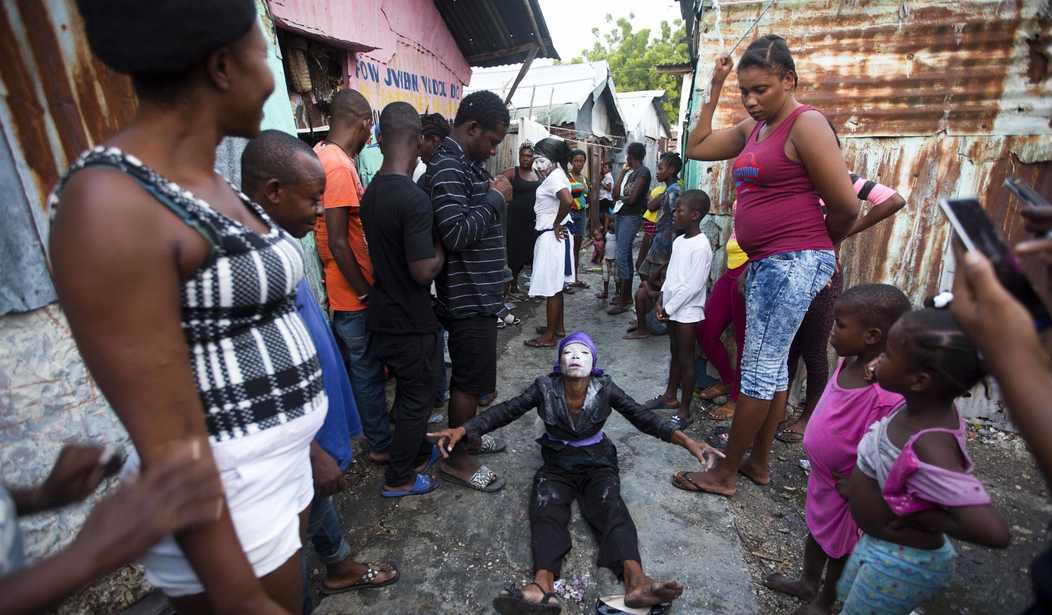U.S. Secretary of State Antony Blinken told a regional conference of Caribbean nations that international assistance for Haiti was desperately needed to stabilize Haiti’s humanitarian and security crisis, which is spiraling out of control. He said the United States was in complete agreement with the United Nations and Haiti’s Prime Minister Ariel Henry that only military troops could restore the situation.
Ever since the assassination of Jovenel Moïse, the president of Haiti, on July 7, 2021, chaos has reigned in the streets of Haiti’s major cities. Gangs have taken over and “control large parts of the capital Port-au-Prince and access to water, food, and health care,” according to USA Today. Blinken and Henry “agreed on the urgency of deploying a U.N.-authorized multinational force or peacekeeping operation” to help Haiti’s police “restore order.”
Blinken didn’t go so far as to say that the U.S. would commit men and supplies to such an operation. But — and no surprise here — not one single country has stepped forward to say they would lead such an effort.
Not one single country.
First of all, “helping Haiti’s police restore order” is a ludicrous goal. The gangs are extremely well-armed, while the police are poorly armed sitting ducks. What’s needed in Haiti will never happen: a military dictator who will have the power to ruthlessly suppress the gangs, reestablish civil government, protect private property, and create some kind of economy. This may be the biggest challenge since Haiti has never had a “thriving economy.”
There are calls from Haiti’s elites for the United States to drop its current support for Henry.
“Why does the U.S. State Department continue to support someone who is by all accounts incompetent and unable to appease the situation? We don’t know,” said Francois Pierre-Louis, a professor of political science at Queens College CUNY.
The professor says that after giving an opening speech to the conference, Henry locked himself in his hotel room and didn’t budge for the rest of the conference.
“Henry will do nothing,” said Daniel Foote, a former U.S. envoy to Haiti who resigned from the role in September 2021. Foote claims that a “deeply flawed” U.S. policy toward the country, including an “inhumane, counterproductive decision to deport thousands of Haitian refugees,” led to his resignation. Foote also said Henry saw the talks with foreign diplomats as “a cover” to give him time to plan and schedule an election. But he said that even if there is a vote “the election results won’t be acceptable to the population.”
“Haiti will continue to spiral,” he said, “and we’ll be talking about what’s next in the chaos afterwards.”
So that’s a big part of the problem that the U.S. — ever sensitive to charges of “imperialism” — won’t be able to adequately address. It starts with leadership, and if there’s an empty suit in charge, nothing is going to change. And if Biden doesn’t have the guts to endure charges of being an imperialist, at least some of the coming catastrophe is his fault.
“Brutal gangs have a stranglehold on the people of Haiti,” U.N. Secretary-General António Guterres told journalists. “Port-au-Prince is encircled by armed groups that are blocking roads, controlling access to food and health care, and undermining humanitarian support… I have heard appalling accounts of women and girls being gang-raped, and of people being burned alive.”
The gangs are deeply entrenched and have an infrastructure that would be the envy of some legitimate governments. Meanwhile, the UN must be left out of the loop if anything is going to get done in Haiti. A UN document that was circulating since last month, labeled “Enhanced Security Support to Haiti, Non-paper,” says the multinational force must work with the Haitian National Police (HNP) to achieve success.
“An international force must not substitute for, but complement, the HNP, and provide it with adequate capabilities, weapons, equipment and specialized expertise,” the document states. “High coordination and division of labor between the force and the HNP will be critical.”
Do you know what else will be “critical”? Ordering the HNP to go home and not come out until the gangs are eliminated.
The police “needs help with domestic gangs, international police experts in fighting organized crime, armed gangs, financial crimes, kidnapping, and how to conduct urban operations,” William O’Neill, the U.N.’s newly appointed human rights expert on Haiti, said during a press conference Tuesday in New York.
The Haitian police need help blowing the paramilitary gangs to kingdom come. If the UN gets its wish, there are going to be a lot of dead peacekeepers in blue helmets and a slaughtered Haitian National Police force.
So once again, the burden will fall on America and its professional army. And once again, everything that could possibly go wrong will be blamed on the soldiers who will be asked to do an impossible, thankless job — sometimes at the cost of their own lives.
They will go and they will fight because that’s the job they’ve been trained to do — a job no other army in the world is better at doing.










